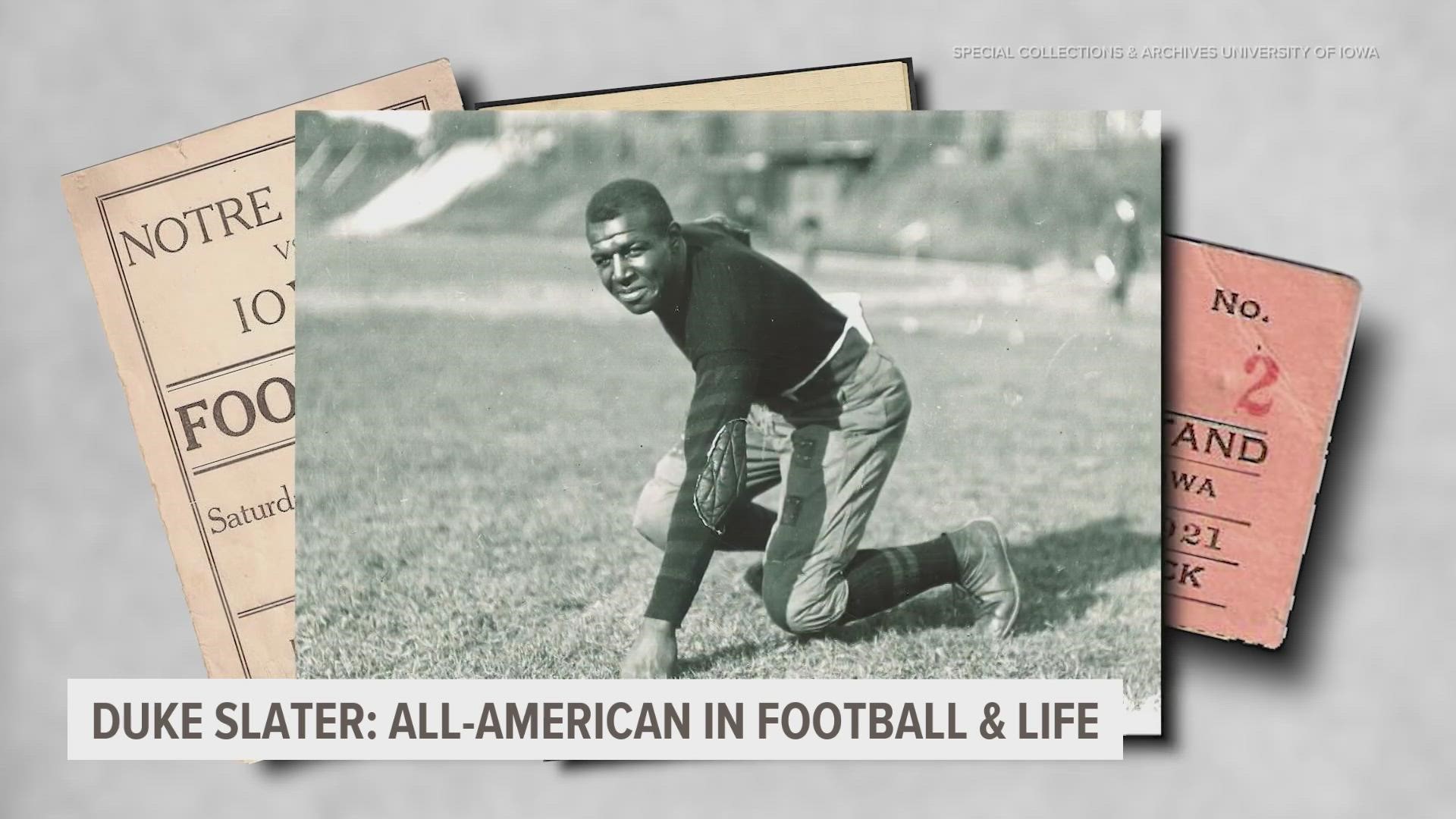CLINTON, Iowa — In the small town of Clinton, the legend of Frederick Wayman Slater — better known as Duke Slater — began to form.
Duke and his family moved to the area when he was 13 years old, and he made his mark in more ways than one.
Some still remain to this day.
On the football field, Duke was a spectacular talent and helped Clinton High School win two state championships. Off the field, he was a well-rounded student.
"He was a very good student here. He was also in the drama club. He performed in a couple of plays," said Bill Misiewicz, a teacher at Clinton High School.
His can-do attitude and joyous spirit made him well-liked by many of his peers, with author Neal Rozendaal sharing about his public persona.
"Duke Slater had a tremendous personality. People really loved him. When people were around Duke Slater, they couldn't help but like him, and I think particularly when he was playing football," Rozendaal said. "To be a Black man in that era playing football, he faced a lot of prejudice. There were a lot of late hits and cheap shots and things of that nature."
Rozendaal wrote a biography on Duke's life and legacy.
"They said that the smile never left his face. He was always someone who just always had good humor and he was able to diffuse situations that might have been problematic for other people, both because of his personality but [also because] most of the time, he was the strongest person on the field. And those things, he was able to use to battle the prejudice of the time," he added.
Duke's talents led him to the University of Iowa, where he played football from 1918 to 1921. During his time as a Hawkeye, he was a three-time All-Conference Selection and a two-time All-American.
During a time where racism created constant barriers for African Americans in all aspects of life, Duke continued to defy the odds and blaze a path for other Black players to follow.
In 1922, Duke became the first African American lineman in the NFL and
went on to play 10 seasons, where he was a seven-time all-pro.
"He was a terrific football player. He really was in his day widely regarded as one of the greatest lineman to ever play the sport," Rozendaal said.
That's what Duke is best remembered for, but what he went on to achieve after his football career was just as remarkable.
Duke pursued a law degree from the University of Iowa while he was still in the NFL. After earning his degree in 1928, he went on to become a lawyer and practice in the Chicago metro.
About 20 years later, he became the second African American judge elected to the Cook County Municipal Court — and by 1960, he became the first African American judge elevated to the Chicago Superior Court.
Through all this, Duke was actively working for the advancement and empowerment of minorities in the united states.
"He was advising president Truman to create the Fair Employment Practices Act in 1948. He was also instrumental in advising the president to ban segregation in the armed forces which was a tremendous step after World War II of creating democracy not only for Europe but also here in the United States," said Duke's coach, Francis Boggus.
Boggus, who also is part of the Clinton County Community Hometown Pride Committee, said that Duke was an activist through and through.
"[He] put the words of the constitution into actual effect and how they affected minority groups who were being discriminated against, it gave them a vehicle to be heard and acknowledged their importance and dignity as human beings," Boggus said.
Duke's community was always at the center of everything he did, and he made it a point to give back and mentor the next generation.
"He's someone that, in every aspect of his life, strived to be the very best he could, and I think he should be looked upon as a beacon of hope," Boggus said.
For a while, it seemed Duke's legacy was being forgotten with every passing year.
But the Duke Slater Memorial Statue Committee is making sure his legacy lives on in Clinton.
They're installing a life-size statue of Duke across from Clinton High School.
"The statue will be overlooking the football field which we think will be an aspiration for young people seeing that and saying if he can achieve it, I can achieve that too," Boggus said.
In addition, they'll be establishing a scholarship fund in his name.
You see, playing football was what he did — but it didn't define who he was.
"Who he was and what he was, that's more important than making a special block to win the big game against Notre Dame and being one of the greatest Hawkeyes of all time. Again, this is a man of huge character, and this is something our community should be able to hang our hats on." Misiewicz said.
Whether it was on the field, in the courtroom or spending time with people in his community, Duke's character always has and will continue to shine through.

